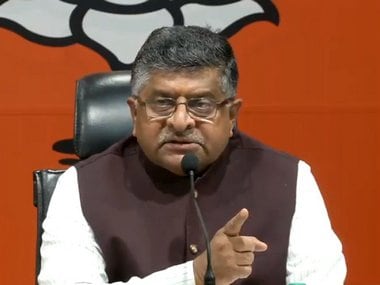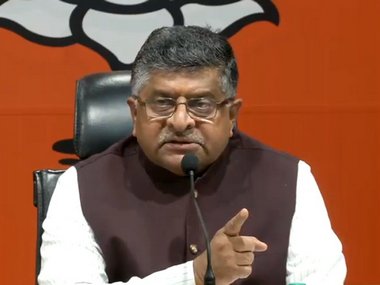The facts in WhatsApp scandal are yet to fully emerge but we already have a narrative. It is a simple narrative. According to the Congress and a section of Indian media, the government of Prime Minister Narendra Modi enlisted an Israeli hacking tool developer to break into the mobile phones of a few individuals it dislikes and illegally spy on them. These targets apparently include human rights activists, their lawyers, civil society members, government critics and some journalists: in short, an amphibious group that governments love to hate. [caption id=“attachment_5240351” align=“alignleft” width=“380”]  File image of Union minister Ravi Shankar Prasad. PTI[/caption] The details are still sketchy. There are a lot of unanswered questions and loopholes in the narrative, but that hasn’t stopped the Congress from accusing the BJP-led NDA government of snooping and calling on the Supreme Court to take suo motu cognisance of these “illegal activities” and “hold the government to account”. The second part of this narrative is even more familiar. Modi critics and liberals have latched on to the development as yet another vindication of their stand that this is a fascist government bent on subverting the Constitution and Indian democracy. While the narrative may suggest what it will, it is important to sift fact from fiction. The startling development came to light when WhatsApp, a popular social media messaging app used by 1.5 billion across the globe (including 400 million in India alone, its biggest market) told a US federal court in San Francisco on Tuesday that ‘Pegasus’ — a spyware developed by Israeli surveillance firm NSO Group — was used to hack into the mobile phone devices by exploiting some security vulnerabilities and mine data from the platform even though WhatsApp boasts of “impregnable end-to-end encryption” of user data. The targets, according to information so far in public domain, include 20 Indians among at least 14,00 individuals spread over 20 countries and five continents. Their phones were ostensibly illegally accessed by the hackers between 29 April and 10 May, 2019. While WhatsApp has not revealed the identities of those whose privacy was breached, a spokesperson of the Facebook-owned firm was quoted as saying by The Indian Express “while I cannot reveal their identities and the exact number, I can say that it is not an insignificant number.” WhatsApp also claimed to have contacted each of the individuals who were affected to warn them and take some steps to secure personal data. As per a report in Scroll, there have been 17 confirmed cases of spyware targeting activists, lawyers and journalists. Some were apparently linked to the high-profile Bhima Koregaon case. A report in _Firstpost_ places the number of confirmed cases to 20, of which a majority are linked the case mentioned above. This website also put out a list of those names. The million-dollar question in the rapidly snowballing scandal is this: Who contracted the Israeli surveillance firm to carry out the spying? It is worth noting that India is only one among 20 countries affected by the spyware. Other nations where officials and activists have been targeted include United States, United Arab Emirates, Bahrain, Mexico and Pakistan. NSO Group, the Israeli firm in the eye of the storm run by Omri Lavie and Shalev Hulio, both veterans of Israel’s elite Unit 8200 signals intelligence arm, issued a statement saying that it abides by a human rights policy and its “technology is not designed or licensed for use against human rights activists and journalists”. The company, which is battling the lawsuit filed in US federal court, claimed that it is unable “to disclose who is or is not a client or discuss specific uses of its technology” and that its products are only used by government agencies to catch terrorists and criminals. From the information available so far, it is not unreasonable to demand an explanation from the Indian government. Since the allegations are serious, only a full and complete denial from the BJP-led NDA government — that it has not indulged in any form of unauthorized snooping — will put the controversy to rest. It is pertinent to point out here that governments can and do carry out surveillance activities against own citizens and such an act cannot automatically be deemed unconstitutional, as long as such decisions are taken in consonance with the law. If the government perceives a threat against the State from a group or an individual, or if it is in possession of such credible evidence that may make such an act necessary, then it may direct the appropriate agencies to carry out surveillance. In response to the swirling controversy, Union Minister for Information and Broadcasting Ravi Shankar Prasad demanded an explanation from WhatsApp on the breach of privacy of Indian citizens on its messaging platform and has given it until 4 November to come up with a response. The minister has also released a statement on Twitter, clarifying that “the government is committed to protecting the privacy of all Indian citizens. Government agencies have a well-established protocol for interception, which includes sanction and supervision from highly ranked officials in central and state governments, for clear stated reasons in national interest.”
Government of India is concerned at the breach of privacy of citizens of India on the messaging platform Whatsapp. We have asked Whatsapp to explain the kind of breach and what it is doing to safeguard the privacy of millions of Indian citizens. 1/4 pic.twitter.com/YI9Fg1fWro
— Ravi Shankar Prasad (@rsprasad) October 31, 2019
The Union government’s response indicates that it was caught unawares. It refuted allegations that it was involved in illegal snooping. The Union minister’s statement read: “Attempts to malign the government for the reported breach are completely misleading. The government will take action against any intermediary for breach of privacy.” At this stage, it is pertinent to let the facts emerge instead of jumping to premature conclusions. Rahul Gandhi and Congress’ reactions have been disappointing. Rahul attempted to link Rafale issue with the WhatsApp development.
The Govt seeking WhatsAop’s response on who bought Pegasus to spy on Indian citizens, is like Modi asking Dassault who made money on the sale of RAFALE jets to India!#WhatsApp https://t.co/6zlqXKGTFG
— Rahul Gandhi (@RahulGandhi) October 31, 2019
Even if we assume that the NDA is guilty of illegal surveillance, it is a bit rich for Congress to take the moral high ground over an issue on which it has a startling track record, ranging from its links with the infamous Cambridge Analytica to allegations of subjecting Pranab Mukherjee or General VK Singh to illegal surveillance. Moreover, the entire narrative against the government rests on what the NSO Group, makers of the spyware, says. Why should we take at face value the words of a surveillance company that makes products to hack into targets’ phones? The Israeli firm has stated that its services are offered only to catch terrorists and criminals. It could say anything to deflect attention and defend its case in court. Finally, the role of WhatsApp in this entire controversy must not go unheeded. If its state-of-the-art encryption technology can be subject to illegal surveillance (in this case the hacking seems to have been initiated by exploiting a vulnerability associated with its video-calling feature), then there is no way users may trust the messaging platform with their privacy or personal data. The government’s role in this context is even bigger. Aside from clarifying it had no role to play in the controversy, it must put in place a system of accountability for social media platforms so that these companies may not escape responsibility by exploiting legal loopholes.


)

)
)
)
)
)
)
)
)



